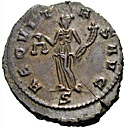The Third Seal Of Revelation 6
This Revelation Timeline Decoded Bible study focuses on the third seal of Revelation 6.
Revelation 6:5-6, “I looked, and behold, a black horse, and he who sat on it had a pair of scales in his hand. And I heard a voice in the midst of the four living creatures saying, “A quart of wheat for a denarius, and three quarts of barley for a denarius; and do not harm the oil and the wine.”
Here’s a short summary of the fulfillment of the 3rd seal of Revelation 6, then a video will give more details, followed by a verse by verse explanation.
The Black horse represents a period gloom and despair, as the Romans suffered under excessive taxes that were needed to pay for wars. The prices for wheat and barley that the Lord decreed were the exact prices from 222-235 A.D.
Remember that the Lord Jesus is judging the pagan Roman Empire because they killed millions of Christians. He is avenging justice for their deaths.
The color of the horse represents the condition of the Roman people at that time, and the description of the rider represents the cause of their condition.
 The black horse represents the despair and gloom of the Roman people, as they were taxed excessively to pay for all of the wars, which caused a major economic depression.
The black horse represents the despair and gloom of the Roman people, as they were taxed excessively to pay for all of the wars, which caused a major economic depression.
As you can see on this coin, the pair of scales represented the justice and commerce of the Roman Empire.
If citizens couldn’t pay their taxes in coinage, they were allowed to pay with the equivalency of wheat or barley.
The prices given for wheat and barley were the exact price at the time of Emperor Severus Alexander, who was in power from 222-235 A.D..
As the taxes increased, the burden got heavier on the people and they were ground down and they suffered as the economy declined.
To hurt not the oil and the wine, means to be not unjust to them. In other words, let the taxation be fair as compared to the prices of wheat and barley, instead of raising the prices on oil and wine even more.
In those days, oil and wine were not just luxuries, but they served many purposes in people’s lives. Paul told Timothy, “No longer drink only water, but use a little wine for your stomach’s sake and your frequent infirmities.”
The agricultural industry was ruined under this heavy taxation, which lead to famine. People moved away from the farmlands into the cities, where they would suffer from the famine.
Historian Arther Ferrill agrees with other Roman historians such as A.H.M. Jones:
…the decay of trade and industry was not a cause of Rome’s fall. There was a decline in agriculture and land was withdrawn from cultivation, in some cases on a very large scale, sometimes as a direct result of barbarian invasions.
However, the chief cause of the agricultural decline was high taxation on the marginal land, driving it out of cultivation. Jones is surely right in saying that taxation was spurred by the huge military budget and was thus ‘indirectly’ the result of the barbarian invasion
Next Revelation Timeline Decoded Bible Study: Revelation 6 – 4th Seal Pale Horse




{ 0 comments… add one now }